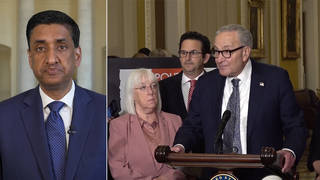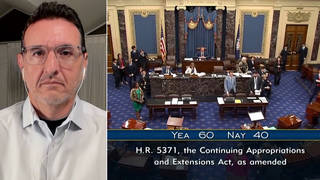This content originally appeared on Democracy Now! and was authored by Democracy Now!.
This post was originally published on Radio Free.
This content originally appeared on Democracy Now! and was authored by Democracy Now!.
This post was originally published on Radio Free.
This content originally appeared on Democracy Now! and was authored by Democracy Now!.
This post was originally published on Radio Free.
This content originally appeared on Democracy Now! and was authored by Democracy Now!.
This post was originally published on Radio Free.

Democracy Now! speaks with the renowned Iranian filmmaker Sepideh Farsi, the director of the new documentary “Put Your Soul on Your Hand and Walk.” The film is based on regular video calls Farsi made with the Palestinian photojournalist Fatma Hassona in Gaza over the course of a year from April 2024 to April 2025.
Hassona was killed with her family by an Israeli missile that targeted her apartment building in northern Gaza. The strike occurred just one day after she learned that the film centered around her life and work had been selected to premiere at the Cannes Film Festival. “It’s something that I will never get over,” says Farsi.
This content originally appeared on Democracy Now! and was authored by Democracy Now!.
This post was originally published on Radio Free.

A new series by Drop Site News looks at Jeffrey Epstein’s ties to Israeli intelligence and how he secretly brokered numerous deals for Israeli intelligence. Drop Site revealed that Epstein had played a role in brokering a security agreement between Israel and Mongolia and setting up a backchannel between Israel and Russia during the Syrian civil war.
Epstein had an “extensive relationship with Israeli intelligence, U.S. intelligence and the intelligence agencies of other countries as well,” says Murtaza Hussain, reporter for Drop Site News. “He was a dealmaker and a fixer at a very, very elite level.”
This content originally appeared on Democracy Now! and was authored by Democracy Now!.
This post was originally published on Radio Free.

The government shutdown has brought attention to food insecurity in the United States, as it disrupted the Supplemental Nutritional Assistance Program, or SNAP, which helps about 42 million people across the country. Delayed and partial payments have occurred despite the availability of contingency funds to keep the program going during the shutdown, because the Trump administration initially chose not to use those funds. “42 million Americans, 16 million of them children, are really struggling to be able to afford nutritious food for their health,” says Mariana Chilton, child hunger expert. “It’s deeply concerning.”
This content originally appeared on Democracy Now! and was authored by Democracy Now!.
This post was originally published on Radio Free.

The longest U.S. federal government shutdown in history has entered its 43rd day. The House of Representatives is returning to session today to vote on a short-term funding bill to end the shutdown. The Senate approved the measure on Monday after seven Democrats and one independent backed the Republican bill even though the bill did not include an extension of the Affordable Care Act subsidies, which was a key demand for Democratic lawmakers. Some Democrats in the House are now calling for Senator Chuck Schumer to resign his position as minority leader — including Democratic congressmember from California, Ro Khanna. “The President was panicking,” says Khanna. “He realized that he had lost the election over this. We caved too soon.” Khanna also discusses his bill to force the public release of the Epstein files, surrounding the federal investigation into the serial sexual predator Jeffrey Epstein.
This content originally appeared on Democracy Now! and was authored by Democracy Now!.
This post was originally published on Radio Free.
This content originally appeared on VICE News and was authored by VICE News.
This post was originally published on Radio Free.
Democracy Now! Wednesday, November 12, 2025
This content originally appeared on Democracy Now! Audio and was authored by Democracy Now!.
This post was originally published on Radio Free.
This content originally appeared on Democracy Now! and was authored by Democracy Now!.
This post was originally published on Radio Free.
This content originally appeared on Democracy Now! for Broadcasters – HD MP4 and was authored by Democracy Now! for Broadcasters – HD MP4.
This post was originally published on Radio Free.
This content originally appeared on Democracy Now! and was authored by Democracy Now!.
This post was originally published on Radio Free.
This content originally appeared on Democracy Now! and was authored by Democracy Now!.
This post was originally published on Radio Free.
This content originally appeared on Democracy Now! and was authored by Democracy Now!.
This post was originally published on Radio Free.
This content originally appeared on Democracy Now! and was authored by Democracy Now!.
This post was originally published on Radio Free.
This content originally appeared on Democracy Now! and was authored by Democracy Now!.
This post was originally published on Radio Free.
This content originally appeared on Democracy Now! and was authored by Democracy Now!.
This post was originally published on Radio Free.
This content originally appeared on Democracy Now! and was authored by Democracy Now!.
This post was originally published on Radio Free.

The new documentary Free Joan Little chronicles the landmark case of the first woman in U.S. history to be acquitted on the grounds of self-defense against sexual violence. Joan Little’s 1975 murder trial inspired a national campaign for racial justice, prisoner’s rights, and survivors’ rights to self-defense. Director Yoruba Richen calls the movement to free Little a “cry for justice” and Little’s trial testimony about her assault by a prison guard “a radical act” that helped expose “the scourge of violence and abuse in jails and in prisons.” Free Joan Little premieres this week at the DOC NYC Film Festival.
This content originally appeared on Democracy Now! and was authored by Democracy Now!.
This post was originally published on Radio Free.

Last week, at the Spanish-immersion daycare center Rayito del Sol in Chicago, employee Diana Santillana was violently abducted and detained by immigration agents in front of parents and young children. “My son was completely shut down emotionally after this happened,” says Tara Goodarzi, the parent of a three-year-old who attends Rayito del Sol and witnessed the aftermath of the arrest. “He was just so shocked by the state that his school and his safe place had transformed into.” Goodarzi also shares how community members are resisting the Trump administration’s anti-immigrant crackdown in Chicago, organizing protests, patrols, meal trains and rideshares to support immigrant neighbors.
This content originally appeared on Democracy Now! and was authored by Democracy Now!.
This post was originally published on Radio Free.

We speak to The American Prospect’s David Dayen about what could be the end to the longest government shutdown in U.S. history, after seven Democratic Senators and one independent struck a deal with Republicans to pass a short-term government funding bill. “Why would you end this?” asks Dayen, echoing many in the Democratic coalition who believe the deal was a poor strategic move for the anti-Trump opposition. Calls are now growing for Senate Minority Leader Chuck Schumer to step down. “Donald Trump and the Republicans were being blamed for all of this chaos…and yet, days later this this group of Democrats with the tacit support of Chuck Schumer decide that they’re going to end this and cave.”
This content originally appeared on Democracy Now! and was authored by Democracy Now!.
This post was originally published on Radio Free.

We speak to The American Prospect’s David Dayen about what could be the end to the longest government shutdown in U.S. history, after seven Democratic Senators and one independent struck a deal with Republicans to pass a short-term government funding bill. “Why would you end this?” asks Dayen, echoing many in the Democratic coalition who believe the deal was a poor strategic move for the anti-Trump opposition. Calls are now growing for Senate Minority Leader Chuck Schumer to step down. “Donald Trump and the Republicans were being blamed for all of this chaos…and yet, days later this this group of Democrats with the tacit support of Chuck Schumer decide that they’re going to end this and cave.”
This content originally appeared on Democracy Now! and was authored by Democracy Now!.
This post was originally published on Radio Free.
This content originally appeared on Democracy Now! and was authored by Democracy Now!.
This post was originally published on Radio Free.
Democracy Now! Tuesday, November 11, 2025
This content originally appeared on Democracy Now! Audio and was authored by Democracy Now!.
This post was originally published on Radio Free.
Democracy Now! Tuesday, November 11, 2025
This content originally appeared on Democracy Now! Audio and was authored by Democracy Now!.
This post was originally published on Radio Free.
This content originally appeared on Democracy Now! for Broadcasters – HD MP4 and was authored by Democracy Now! for Broadcasters – HD MP4.
This post was originally published on Radio Free.
This content originally appeared on Democracy Now! for Broadcasters – HD MP4 and was authored by Democracy Now! for Broadcasters – HD MP4.
This post was originally published on Radio Free.
This content originally appeared on Democracy Now! and was authored by Democracy Now!.
This post was originally published on Radio Free.
The Freedoms Committee of the Palestinian Journalists’ Syndicate says the Israeli occupation forces have killed 44 Palestinian journalists inside displacement tents in the Gaza Strip.
The committee said that these journalists were among 254 media workers who had been killed since the beginning of the Israeli assault on Gaza in October 2023 until the end of October 2025, reports Middle East Monitor.
According to the report, the attacks were systematic, targeting displacement tents located around hospitals and UNRWA shelters, in addition to direct sniper shootings inside displacement areas.
It added that the victims were working for local and international media outlets, and most of them were killed while covering the humanitarian situation in the displacement camps.
The syndicate affirmed that such targeting reflects a deliberate attempt to silence the Palestinian press and prevent the truth from reaching the world.
It also stressed the need to hold the Israeli occupation accountable for its crimes against journalists and to ensure international protection for media crews working in Gaza.
Israel’s audiovisual media bill ‘a nail in coffin of editorial independence’
Meanwhile, the Paris-based media freedom watchdog Reporters Without Borders (RSF) has sounded the alarm following the first reading of a bill sponsored by Israel’s Communications Minister Shlomo Karhi that would strengthen the executive branch’s control over the audiovisual media, despite opposition from the Attorney General and the Union of Journalists in Israel.
The bill includes measures that RSF condemned a year ago.
Although the rest of the legislative process is likely to be difficult, Israel’s Communications Minister Shlomo Karhi, a member of Prime Minister Benjamin Netanyahu’s Likud party, has managed to get a foot in the door. On the evening of November 3, around midnight, his media broadcasting bill was adopted after its first reading, as part of a voting pact with ultra-Orthodox MPs.
The bill calls for the creation of a Broadcast Media Authority largely composed of members appointed by the Communications Minister himself. His ministry would also be entrusted with calculating television audiences, a measure approved by the Ministerial Committee for Legislation a year ago that was condemned by RSF.
Legal and legislative barriers are already being put in place in response to this attempt to strengthen the Israeli government’s control over the media landscape.
Attorney-General Gali Baharav-Miara, who is responsible for advising the government on legislative matters, is opposed to the bill, which has been deemed unconstitutional by the Knesset, Israel’s Parliament.
Two petitions against the bill have also been filed with the Supreme Court. One was submitted by the Union of Journalists in Israel, which represents around 3000 media professionals. The other was instigated by the NGO Hatzlacha (meaning “success” in Hebrew), which promotes social justice.
“This first reading vote is the first nail in the coffin of broadcast media’s editorial independence in Israel,” said RSF editorial director Anne Bocandé.
“Communications Minister Shlomo Karhi is openly attacking a pillar of democracy. Against a backdrop of war and an upcoming election campaign, Benjamin Netanyahu’s government is seeking to silence voices that are critical of the far-right coalition in power.
“RSF reiterates the warning it issued a year ago: these legislative attacks will have lasting, negative consequences on Israel’s media landscape.”
Incorporating the ‘Al Jazeera’ ban on foreign broadcasters into common law
In parallel with his legislative attack on the editorial independence of the country’s broadcast media, Communications Minister Shlomo Karhi is also continuing his battle against international broadcasters operating in Israel.
Although his so-called “Al Jazeera law” — which allowed Israeli authorities to shut down any foreign broadcasters perceived as undermining national security and was condemned by RSF in April 2024 — expired on October 27 with the end of the state of emergency, the minister informed the National Security Council — which is attached to the Ministry of National Security — that he now intended to turn the measure into common law.
After the missile exchanges between Israel and Iran in June 2024, the Prime Minister’s party had already attempted to amend the “Al Jazeera law” in an attempt to give additional powers to the Minister of Communications to stop the broadcasting of foreign channels in the country.
This content originally appeared on Asia Pacific Report and was authored by Pacific Media Watch.
This post was originally published on Radio Free.